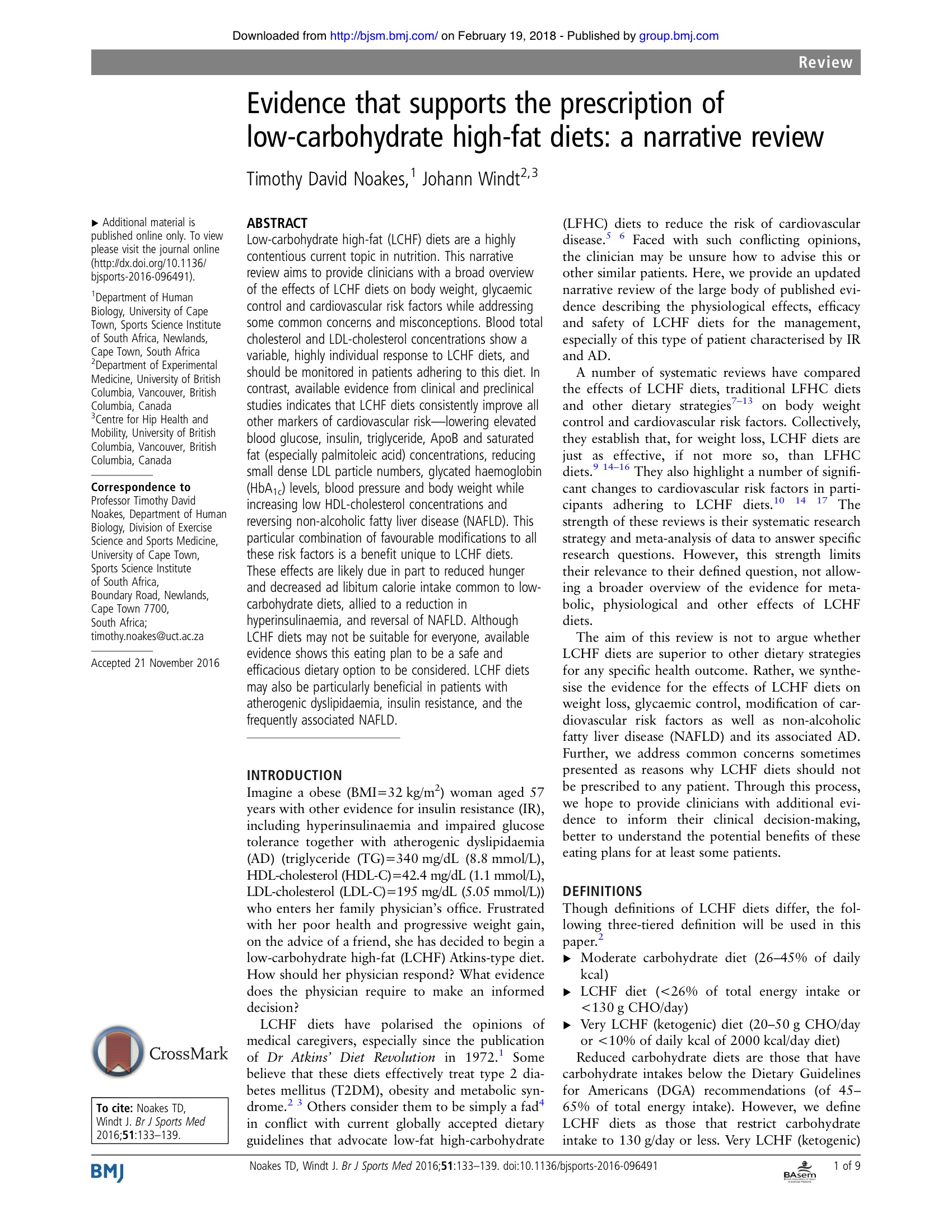
Somehow I missed this article, or actually, I’m still catching up 🙂 .
As the title says, this is a good review of the state of low-carbohydrate diets, how they are thought to work, and what their impacts are.
Thinking “healthy fat” rather than “high fat” diet
I appreciate the comment
Therefore, even though the relative contribution of fat to dietary energy intake may increase, the absolute fat intake may not. As a result, the term ‘high fat’ diet may be misleading. Hence, the term low-carbohydrate healthy fat is probably more appropriate.
And I may begin to use this as the full representation of “LCHF” because “high fat” seems shocking to fellow physicians, who, for 70 years, have received nutritional education, just not in a rigorous, academic manner:
I also appreciate the fairness of this statement:
LCHF diets clearly perform at least as well as do any other dietary approach, even in trials in which energy intake on the LCHF diet is unrestricted (ad libitum).
There’s a lot more in the piece about why this way of eating is metabolically useful, beyond weight loss, which I think confuses a lot of people, who believe the sole advantage is weight loss (it’s more than that)
My Prep for Low Carb Breckenridge
I’m going to Low Carb Breckenridge in a few weeks, and my education has in a sense come semi-full circle this time compared to my visit to Low Carb San Diego. I find it interesting that I’m willing to say I’m going to Low Carb Breckenridge before I actually go. I only posted about Low Carb San Diego after it was over (see: Adventures at Low Carb San Diego.
This time around, I’m interested in following up on some items I discovered for the first time in San Diego, or want to gain more perspective on based on various conversations. This is in addition to the basics the paper lays out well about metabolic changes, and studies on efficacy for reversing diabetes and weight loss (which are two separate things).
- Non-Alcoholic Fatty Liver Disease – NAFLD – this is especially new to me (and the medical profession). Noakes’ treatment of the management of NAFLD is a little light in this piece. I’m going to post more about what I’m reading in the next few days, which to me looks like a lack of consensus on what works. However, from a plausibility perspective, LCHF should be superior to LFHC (low fat, high carbohydrate).
- Animal vs. Plant sources of food – This continues to come up in my world. I’ve done some posting on this already (see this series of posts) which demonstrates to me that this topic is more nuanced than polarized. I believe the common ground are around real vs processed foods (of any source)
The paper reinforces understanding about the negative health consequence of industrial vegetable oils and what we now know about lipid profiles. Interestingly, a response to the article hearkens back to the 20th century understanding, which is about LDL-C only….
The paper is an overall good read, and I find as an adult learner that getting the information presented via multiple perspectives helps a little at a time.
The Unfortunate Continuation of Health Professions Council of South Africa (HPCSA) Campaign against Professor Noakes
Concomittant to reading and benefitting from the information in this article, I along with many, learned that the HPCSA has decided to appeal its own decision acquitting Tim (@ProfTimNoakes) after he was brought up on charges for sending a single informational tweet to a breastfeeding mother.
I signed the petition representing myself, with this comment:
In the history of medicine it has always been the case that interprofessional collaboration is better for the people we serve, who need us at a time of unprecedented threat to their health.
We learned this again and again in the ethical crises that shaped our generation of physicians. If the HPCSA changes course now it will see itself on a different side of history. We’re here to help, because we care. ✌️#LessCarbsAndLessCarbon #dontfearfat
As I wrote in my review of Noakes’ and Sboros (@MarikaSboros) book on the ordeal, I still wish that the HPCSA will learn from what is looking more and more like a mistake (noting, their twitter feed @HPCSA_ hasn’t been updated since 2015, that says something). I know because I have seen the medical profession fail spectacularly in my career ((9) The Embrace of Failure TED EYTAN and REGINA HOLLIDAY TEDxAlvaPark 2012 – YouTube). On the one hand, I wish the experience of being a part of this on every nurse and doctor in their lifetime. On the other, I wish that the suffering of all parties will end, so that we can focus on what’s best for the health of the people we serve.
I’m looking forward to convening with experts and learners in a few weeks to see how I can serve better.
4 Comments
RT @tedeytan: Post: Just Read: Evidence that supports the prescription of #LCHF (or healthy-fat) diets: a narrative review by @ProfTimNoake…
RT @tedeytan: Post: Just Read: Evidence that supports the prescription of #LCHF (or healthy-fat) diets: a narrative review by @ProfTimNoake…
RT @tedeytan: Post: Just Read: Evidence that supports the prescription of #LCHF (or healthy-fat) diets: a narrative review by @ProfTimNoake…
RT @tedeytan: Post: Just Read: Evidence that supports the prescription of #LCHF (or healthy-fat) diets: a narrative review by @ProfTimNoake…